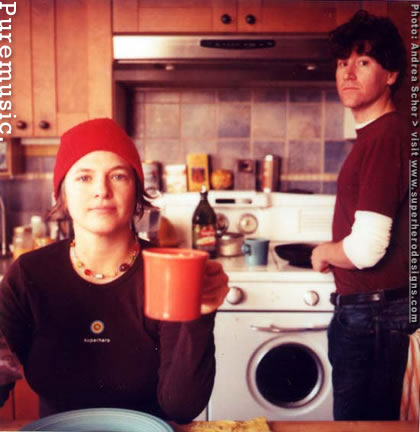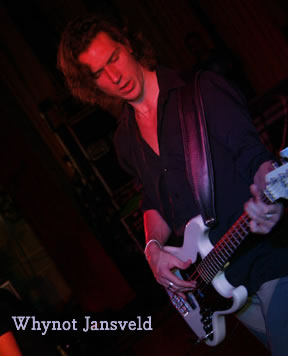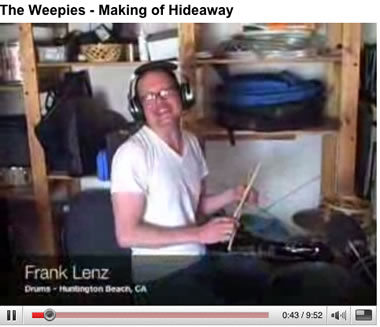
A Conversation with Steve Tannen (continued)
PM: So talk to me, please, about the songwriting process of the group today.
ST: Sure.
PM: How do you write together? Does it happen all possible ways, or is one of you more the lyricist, et cetera?
ST: Yeah, I'd hate to be vague, but it happens all possible ways.
PM: Because I write a lot of songs so I know it just happens all ways.
ST: Exactly. And I don't know if you're like this, but we're like Hamlet in the mad scene, like Hamlet when he's like, "Where are my notes? Where are my notes?" because he's got to write something down.
PM: [laughs] That's funny.
ST: And when I met Deb, you know our names are so similar, and we sort of look like we come from the same European stock.
PM: Right. I see that.
ST: And we have a very similar writing style: we basically write all the time. And it's no big deal for one of us to get up from the dinner table and be like, "I'll be right back. I got to write something down"--or to bring the guitar out and say, "Hey, what do you think of this?" So that was very natural right from the start.
And it continued to be like that. I think that the one thing that we've been able to do now that we're a little more comfortable with it is go off to our caves alone, as well.
PM: Ah, so that's part of it too, that's good.
ST: Sure. And particularly it started with this record, we were really...we felt a little scared to even begin really writing, because we'd been on the road for more than a year, and we were just out of touch with writing. And I think at the beginning of this, particularly, each of us was wondering whether we could still write.
PM: Yeah, "Are we washed up?"
[laughter]
ST: Yeah. Or, "Did I say everything I had to say?"
PM: Right.
ST: Before that we felt like we were really working on a craft. And that helps you get tapped in. You're working it, and you're working it, and then when you get out on the road and there's all this other kind of business bullshit stuff going on--
PM: You can't hardly write.
ST: Exactly. You get a little further away from it all the time. So that's the sort of cave model where you bring your thing back to the table, and you're like, "Well, what do you think of this verse and chorus?" And then after a few months we got much more comfortable with: "Hey, that's a cool riff. Play that, play that." And we'd be in the same room doing that.
PM: So many people that we both know are doing kind of a folk pop thing. It's very unusual when you see someone doing it kind of with unerring infectiousness. It's like, "Wow! What are they doing?"
ST: That's nice. I don't know, man. That's nice of you to say. We often question it. But we don't just like folk pop. I love pop. Like, "I Want You To Want Me," what a phenomenal song. [Cheap Trick]
PM: Yeah, I'm just a pop junkie. I get that.
ST: Come on. And we both grew up with that. "Wrapped Around Your Finger." Any of... you know....
PM: Yeah, because you can't get to real folk pop unless you're a pop junkie. Otherwise it sounds like folk.
ST: I swear, we were playing in a festival in Colorado, and it's really folky. It was called the Folksfest.
PM: Oh, yeah, Folksfest, right.
ST: And I'll tell you what, those people are pop fans, and they don't know it. Obviously they're fans of musicianship, which I think is the hallmark of a folk fan. You know what I mean?
PM: Yeah.
ST: Like some of the great mandolin players who show up at those festivals, it's off the hook. And also the appreciation in the crowd when somebody like Rickie Lee Jones played was just through the roof when she would play, "Chuck E's In Love." It was like, oh, yeah, everybody loves pop. That's why it's called "popular music."
[laughter]
ST: [laughs] Well, you know what Louis Armstrong said? He was asked if he liked folk music, when Bob Dylan was coming. And he said, "All music is folk music. I never heard a horse sing a song."
PM: The worst thing about downloading from iTunes--and yes, I did go back and buy the first record, too, so acute was my condition--
ST: Ah!
PM: --is that you have hardly any credits. So maybe you'd enlighten me and the readership about how Hideaway actually came about, the nuts and bolts.
ST: The first thing I'm going to say is we just posted on youtube The Making of Hideaway just to address exactly this problem which drives us--as fans drives us insane. Because even a band like--oh, God, I don't know, Tool, you just don't know who did what.
PM: Right.
ST: In group bands, like Pearl Jam, is it just Eddie? I don't think so.
PM: Yeah, I doubt that, yeah, right.
ST: Yeah, tell me. So anyway, basically, we had each musician just film themselves in their homes.
PM: This is such an incredible idea.
ST: And it's only possible through the magic of youtube. And a couple people did it on their cell phones. And I edited it all together on iMovie in like half a day, and we posted it.
PM: That's a freakin' fantastic idea, Steve, wow.
ST: So please let people know that, and tell other bands they should do that because people--
PM: Oh, yeah, we'll up the link to the youtube thing right in the interview, yeah. [see that video here]
ST: Nice.
ST: We wrote and recorded the album at home. And we had a real modest setup. We have like one great mic.
PM: What is the platform?
ST: Protools light, man. And we used never more than two inputs.
PM: You're killing me.
ST: Are you a gear head, too? You're going to be disappointed by my gear.
PM: [laughs] Not really, because I like the simple story, too.
ST: All right. Well, we borrowed a Neumann 147 from a buddy of ours.
PM: Shall we credit him?
ST: Sure. His name is Richard Furch--a fantastic engineer, by the way. He works with Jimmy Jam and Macy Gray, he was working on while we were working on this one. He's absolutely great. He lives in L.A. So we had the Neumann. And we borrowed from Joe Ross who mixed the record, borrowed his--I'm going to get it right--
PM: He had the preamp--
ST: The preamp that's a copy of a Neve 1073.
PM: A Vintech?
ST: It's actually a Brent Averill 1073, right into Protools.
PM: Right.
ST: Now, we also used a C-12 vintage mic for some of the instruments, including, very importantly, the drums. Because the drums, we used three mics. We did two overheads, which I think were ribbon mics, and one C-12 right in the middle of the kit.
PM: Right in the middle of the kit, totally cool. Thank you for the very specific data.
ST: Oh, it was angled right over the kick drum, sort of aimed a little bit at the high-hat.
PM: Love it.
ST: Because we tried to over-mic it, and when you stripped it all away and just had the C-12, it was phenomenal. And then when you added a little bit of the room sound it just gave it a little space.
I love the Police, I love Rush, but we don't need that. And let me say, a lot of that has to do with Frank Lenz, the drummer. We basically just did guitar, some keyboards and Wurlitzer, and the "basic vocals," as a sketch, here in our place. And let me say that most of those were sort of one take, and in many cases, most cases, we just went with it in the end because it was the moment of grace, and you catch it, and you're like, "That's something, I don't know what it is, but we can't beat that."
PM: Yeah, right, before your mind takes a hold of it.
ST: Yeah. You're just like, "That's cool. I want to listen to that again, so we'll leave that." So then we went to Frank's. He's down at Huntington Beach. We just drove down and did the drums.
PM: He's a fine player. He really played all the right stuff.
ST: Dude, we met him right before we were making this thing called Say I Am You, which is the last record.
PM: Yeah, that's another great record.
ST: We just clicked immediately. And his drumming on that just blew us away, just blew us away.
And then there's our buddy Whynot Jansveld out of Brooklyn, who's on tour with Gavin DeGraw. He couldn't come by for the session, so I just emailed him the files. I've been playing with Whynot since '99.
PM: I see, that kind of a friend.

ST: Yeah. He's an unbelievable player, very much in demand. And I used to be able to just go over to his house when I lived in New York, and now he's Mr. World Tour. [laughs] He plays with Jonatha Brooke.
PM: Oh, he does. That's where I might have run into him.
ST: Yeah, yeah.
PM: Because I did something with Jonatha not that long ago.
ST: And Jonatha and Deb are friends, actually. So there's a connection all the way around. continue
print
(pdf) listen to clips
puremusic home


